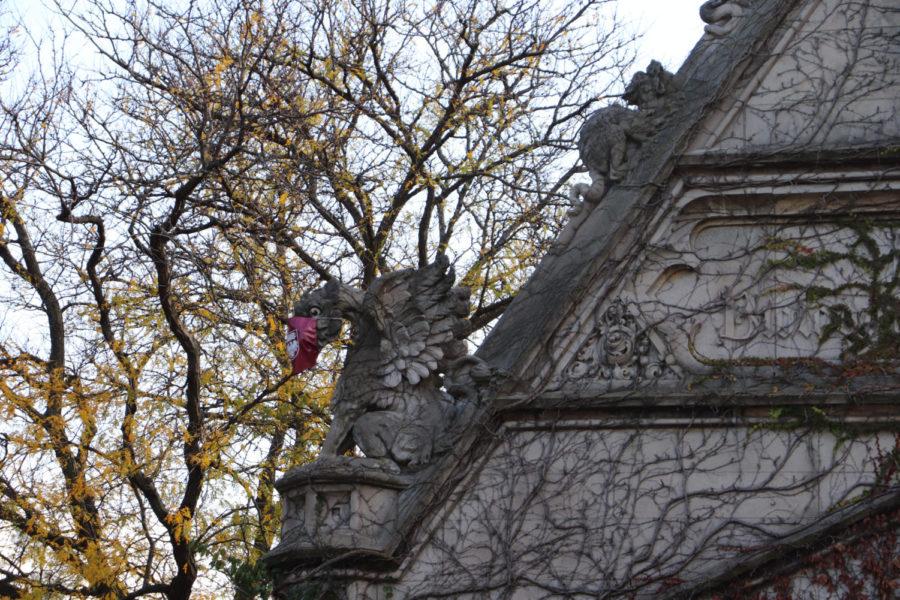This past summer, third-years Audrey Unverferth and Evita Duffy founded the Chicago Thinker, a student newspaper publishing news and opinions from conservative and libertarian points of view. The paper’s purpose is “to defend conservative and libertarian perspectives in a community that is increasingly intolerant of such voices,” according to the Thinker’s mission statement.
Unverferth, who serves as both editor-in-chief and publisher, and Duffy, the paper’s managing editor, hope that the Thinker provides a platform for conservative and libertarian students to express their ideas to the University of Chicago community. “I think it's necessary to have a platform for conservatives and libertarians to thoughtfully speak, and then to hopefully engage with others,” Unverferth said.
“Part of our mission is to expose the student body to a different school of thought, to expose them to conservative and libertarian ideas that aren't usually seen in the campus community,” Duffy said.
Duffy and Unverferth said the Thinker’s founding was prompted by their perception that the campus community is unwilling to engage with conservative and libertarian ideas.
Last March, a post by the University of Chicago’s Institute of Politics (IOP) featured Duffy holding a sign that read “I vote because the coronavirus won’t destroy America, but socialism will.” The photo sparked widespread controversy, inspiring hundreds of posts on social media, some substantive and some aimed at Duffy’s personal character. The incident drew a response from IOP Director David Axelrod.
In May 2019, hundreds of students gathered to protest a bill that Brett Barbin, then a fourth-year College Council representative and head of the University of Chicago College Republicans, proposed to College Council that would have banned student life fees from being used to fund abortions.
“The problem that we're currently facing on campus right now is that conservatives and libertarians are too afraid to speak because of the extraordinary social consequences that individuals like Evita and Brett Barbin have experienced,” Unverferth said.
Nonetheless, Unverferth said the editors of the Thinker are open to publishing work that reflects other points of view. “We happily consider work by those from across the political spectrum,” she said. “We love to communicate across the political aisle, and we disagree, behind closed doors, and also in our pages frequently, so we're not an echo chamber.”
Most of the articles published so far by the Thinker address expressly political topics like qualified immunity and the 2020 elections, but Unverferth wants to publish other content in the future. “I think it would be boring for our readers if we only focused on politics,” she said. “And so I would really like to expand to cover various arts events and sports games, et cetera.”
“Writers are going to focus on stories that they think are important to inform the student body [about] at UChicago,” she said. “They'll cover subjects on everything from what's happening on campus to what's happening abroad.”
The Chicago Thinker is currently a digital-only publication, but Unverferth hopes to publish a physical edition in the future. Her plans, however, have been complicated given the ongoing pandemic. “My goal is to go into print as soon as feasible,” she said. “I think life needs to resume a little bit more to normal, but I would really love to have a print edition by the end of the school year.”
Unverferth confirmed that the Thinker received grant funding from Collegiate Network, a program that supports conservative and libertarian publications on college campuses. The organization is operated by the Intercollegiate Studies Institute (ISI), a nonprofit that supports conservative college students by hosting debates and lectures, providing networking opportunities, and funding conservative student organizations, publications, and fellowships.
“They provided us with a grant to launch our newspaper,” said Unverferth. “They provide mentorship. And in the case of the Chicago Thinker, they provided the funding to build our website.”
Publications supported by Collegiate Network include The Princeton Tory, The Dartmouth Review, and the recently launched Danforth Dispatch at Washington University in St. Louis. ISI’s website lists Supreme Court Justice Neil Gorsuch, who started The Federalist as an undergraduate at Columbia University, and venture capitalist Peter Thiel, who started The Stanford Review as an undergraduate, among the organization’s alumni.
Unverferth said that backing by the ISI will not influence editorial decisions at the Thinker. “We choose how to spend our grant money, we choose what to publish, we chose our name,” she said. “They do not possess any editorial control whatsoever upon what we publish, but they have provided our primary source of funding.”
Looking forward, Unverferth and Duffy hope to raise money to start printing physical copies of the paper. “We're planning to create some form of fundraisers so that we can raise money in order to go into print, and more in conversations with various organizations and alumni and others to obtain funding,” Unverferth said.









